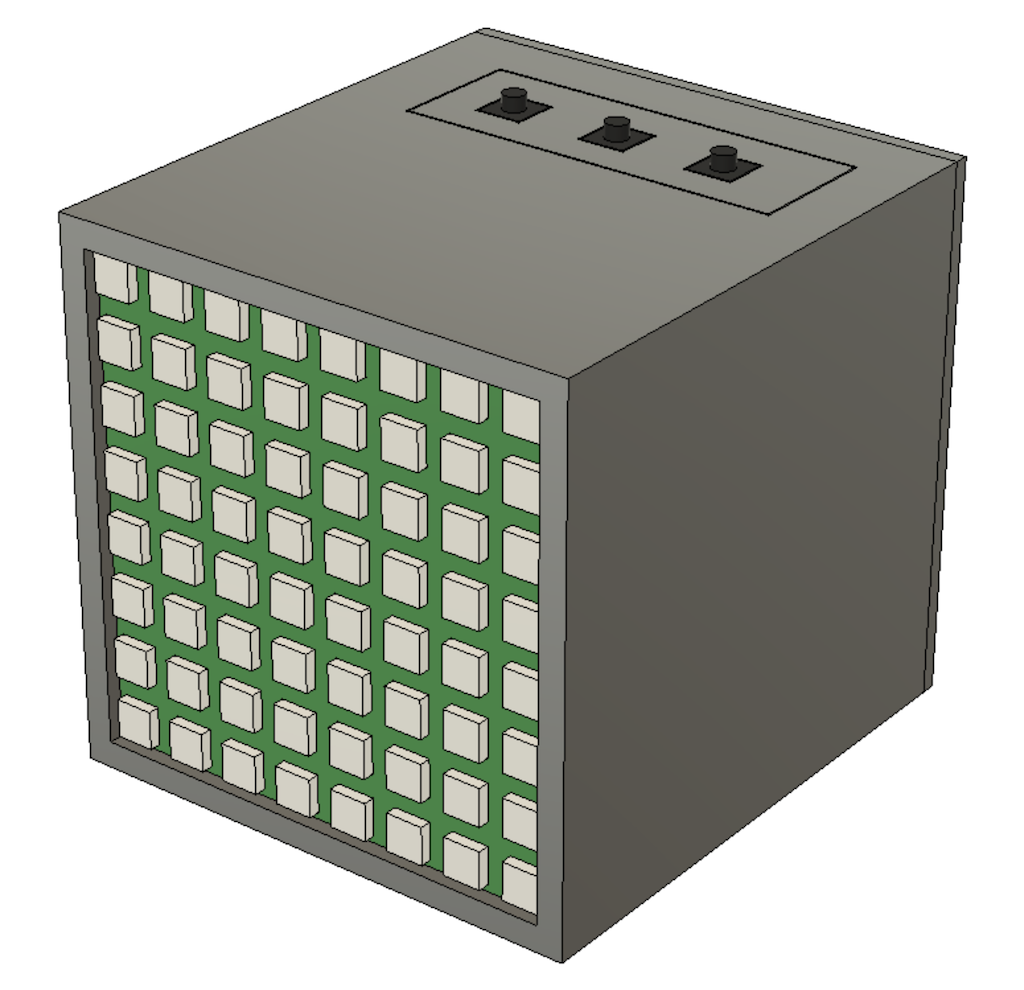A simulation of two chemicals diffusing over time running on an Arduino with an LED matrix as display in a nice little box.
From Reaction-Diffusion Tutorial by Karl Sims
A simulation of two virtual chemicals reacting and diffusing on a 2D grid using the Gray-Scott model:
- Chemical A is added at a given "feed" rate.
- Chemical B is removed at given "kill" rate.
- Reaction: Two Bs convert an A into B, as if B reproduces using A as food.
- Diffusion: Both chemicals diffuse so uneven concentrations spread out across the grid, but A diffuses faster than B.
See also:
- Arduino Uno R3
- FastLED compatible 8x8 LED matrix
- 3 push buttons
- Connect LED Matrix to pin 3 (to change see
LED_PINmacros in filedisplay.h:8) - Connect buttons to pins (to change see
*_PINmacros in filemenu.h:6)PREV(down): 10NEXT(up): 11ENTER(select): 12
- Compile & upload
GrayScott.inoto Arduino using Arduino IDE or Visual Studio Code
Optional:
- 3D print the enclosure contained in files
Enclosure.f3d(for Autodesk Fusion 360) orEnclosure.step
- Mount LED Matrix, Arduino and buttons into enclosure
The simulation starts automatically from a random grid configuration. Long press ENTER to reset/restart the simulation.
Press the ENTER button during simulation to get to the menu. The menu allows changing the simulation parameters. Press the PREV and NEXT buttons to cycle between parameters
- A: diffusion rate
- A+: feed rate
- A': drip rate (*)
- B: diffusion rate
- B-: kill rate
- B': drip rate (*)
- X: close menu
(*) These are two extra simulation parameters not present in the standard Gray-Scott model: drip rate A and B. The drip rate defines the rate at which chemicals A and B "drip" into the grid, just to make it a bit more fun :)
Press ENTER to get to the selected parameter's value. A parameter value is shown as a gradually filled LED matrix. Use PREV and NEXT to decrease and increase the value. Pressing ENTER again sets the value and returns to the menu. Pressing ENTER on X closes the menu All simulation parameters are saved to EEPROM on menu close.
The default simulation parameters are
- Chemical A
- Diffusion rate:
1.0 - Feed rate:
0.055 - Drip rate:
0.05
- Diffusion rate:
- Chemical B
- Diffusion rate:
0.5 - Feed rate:
0.062 - Drip rate:
0.01
- Diffusion rate:
Use PREV and NEXT during simulation to decrease and increase the LED brightness.
The MIT License (MIT)
Copyright (c) 2021-2022 Tim Gleue
Permission is hereby granted, free of charge, to any person obtaining a copy of this software and associated documentation files (the “Software”), to deal in the Software without restriction, including without limitation the rights to use, copy, modify, merge, publish, distribute, sublicense, and/or sell copies of the Software, and to permit persons to whom the Software is furnished to do so, subject to the following conditions:
The above copyright notice and this permission notice shall be included in all copies or substantial portions of the Software.
THE SOFTWARE IS PROVIDED “AS IS”, WITHOUT WARRANTY OF ANY KIND, EXPRESS OR IMPLIED, INCLUDING BUT NOT LIMITED TO THE WARRANTIES OF MERCHANTABILITY, FITNESS FOR A PARTICULAR PURPOSE AND NONINFRINGEMENT. IN NO EVENT SHALL THE AUTHORS OR COPYRIGHT HOLDERS BE LIABLE FOR ANY CLAIM, DAMAGES OR OTHER LIABILITY, WHETHER IN AN ACTION OF CONTRACT, TORT OR OTHERWISE, ARISING FROM, OUT OF OR IN CONNECTION WITH THE SOFTWARE OR THE USE OR OTHER DEALINGS IN THE SOFTWARE.

